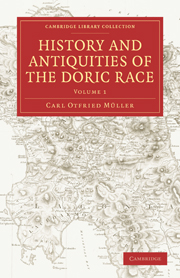Book contents
- Frontmatter
- THE TRANSLATORS' PREFACE
- Contents
- INTRODUCTION
- BOOK I HISTORY OF THE DORIC RACE, FROM THE EARLIEST TIMES TO THE END OF THE PELOPONNESIAN WAR
- BOOK II RELIGION AND MYTHOLOGY OF THE DORIANS
- CHAP. I
- CHAP. II
- CHAP. III
- CHAP. IV
- CHAP. V
- CHAP. VI
- CHAP. VII
- CHAP. VIII
- CHAP. IX
- CHAP. X
- CHAP. XI
- CHAP. XII
- APPENDIX
- ADDITIONS AND CORRECTIONS
- Plate section
CHAP. XI
Published online by Cambridge University Press: 05 August 2011
- Frontmatter
- THE TRANSLATORS' PREFACE
- Contents
- INTRODUCTION
- BOOK I HISTORY OF THE DORIC RACE, FROM THE EARLIEST TIMES TO THE END OF THE PELOPONNESIAN WAR
- BOOK II RELIGION AND MYTHOLOGY OF THE DORIANS
- CHAP. I
- CHAP. II
- CHAP. III
- CHAP. IV
- CHAP. V
- CHAP. VI
- CHAP. VII
- CHAP. VIII
- CHAP. IX
- CHAP. X
- CHAP. XI
- CHAP. XII
- APPENDIX
- ADDITIONS AND CORRECTIONS
- Plate section
Summary
On the Doric Hercules, and his adventures in Thessaly, Ætolia, Epirus, and Doris. Introduction of the mythology of Hercules into Bœotia and Attica.
1. In the following attempt to unravel the complicated mythology of Hercules, we will begin with those fables in which this hero appears evidently as the progenitor of the Doric Heraclidæ, as representative of the heroes of the Hyllean tribe, the highest order in the Doric nation. We will first direct our attention to the locality described in the beginning of the first book, the ancient country of the Dorians in the most mountainous part of Thessaly, where this nation was continually at enmity with its immediate neighbours, the Lapithæ. In this war Hercules appears as the hero of the Hyllean tribe, according to the epic poem Ægimius, and gained for them a third part of the conquered territory. With this contest is, as it appears, also connected the celebrated conquest of Œchalia, the subject of an epic poem called Οἰχαλίας ἃλωσις, which was ascribed to Homer or Creophylus. In this poem it was related how Eurytus of Œchalia, the skilful archer, who was said to have surpassed Hercules himself in this mode of fighting, and who dared to engage with Apolloh, promised his daughter Iole as a prize to the person who should excel himself and his sons in archery; but Hercules having accepted the challenge, Eurytus refused to perform his engagement: upon which Hercules collected an army, conquered (Echalia, killed Eurytus and his sons, carried away Iole prisoner, and gave her in marriage to his son Hyllus.
- Type
- Chapter
- Information
- History and Antiquities of the Doric Race , pp. 425 - 448Publisher: Cambridge University PressPrint publication year: 2010First published in: 1830



